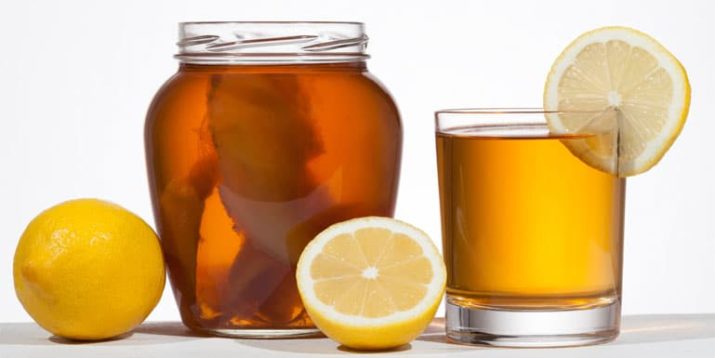The Truth About Kombucha

Kombucha — that tangy, lightly effervescent drink made from sweetened tea and live bacteria and yeast cultures — has a PR problem. Depending on whom you ask, this fizzy, fermented concoction (sales of which have jumped 30 percent in recent years to more than $600 million annually) will either wreak havoc on your body or cure you of everything from gray hair to cancer. So which claims should you believe and which ones can you dismiss? Read on. We scoured the most recent studies and tapped some of the nation’s top nutritionists to cut through the hype and reveal a handful of surprising truths about this centuries-old wellness tonic.
CLAIM: Kombucha cures diseases!
TRUTH: Kombucha can likely help prevent some illnesses.
Kombucha has many potential benefits, but the key word here is “potential.” The current science, summarized in a 2014 review in the Journal of Medicinal Food, concluded that kombucha might be “suitable for prevention against a broad spectrum of metabolic and infective disorders.” Some of kombucha’s ingredients — including glucaric acid, glucosamine, and vitamins B and C — have also shown promise for helping to detoxify the liver, improve joint health, and promote weight loss. But most of kombucha’s purported health-boosting benefits are rooted in its live, active cultures.
Like kimchee, sauerkraut, kefir, and other fermented foods, kombucha contains probiotics, which are bacteria and yeast with proven health benefits, including the improvement of digestive health, which is central to immune function. According to a 2016 study at Teagasc Food Research Center in Ireland, those bacteria can also help keep “bad” gut bacteria, such as Clostridium difficile, in check, and promote the growth of beneficial microbes, such as Lactobacillus — especially following an illness or a course of antibiotics.
Bottom line: Kombucha probably won’t cure cancer or remove the salt-and-pepper from your hair (as some people claim), but it can help your intestinal flora flourish. If you’ve never tried probiotics, and you like the taste of kombucha, consider giving it a shot.
CLAIM: Kombucha can turn you into a genius!
TRUTH: Kombucha may improve brain health.
Two thousand years ago, Hippocrates, the father of modern medicine, claimed that all diseases begin in the gut. Modern science has validated that claim, revealing that gut health has a powerful influence on not only physical health, but also mental wellbeing. Indeed, a 2015 study concluded that anxiety, depression, stress, autism, memory, and learning are all tied to gut health, which in turn may be improved by consuming probiotic foods like — you guessed it — kombucha. It won’t replace antidepressant meds, or bump your IQ up to Mensa level, but it could very well give you a slight mental lift.
CLAIM: Kombucha can poison you!
TRUTH: As long as you take some common-sense precautions, kombucha is safe.
This claim stems largely from two incidents: The 1995 death of an Iowa woman that the CDC suggested was linked to acid buildup from daily kombucha consumption, and the 2009 death of a 22-year-old man with AIDS, whose untimely demise from renal failure was also linked to kombucha consumption. But here’s the thing: In neither case was kombucha proven to be the cause of death. And more important, these are isolated incidents, not hallmarks of a growing trend.
“Even though people have been brewing it forever, kombucha isn’t widely understood yet,” says Hannah Crum, author of The Big Book of Kombucha. “So people read a headline and remember the scary story, even if it’s disproven later.”
The vast majority of health problems, which typically result from excessive or contaminated kombucha, are of the upset stomach/headache/mild rash variety. But as long as you stick to established, unpasteurized consumer brands (pasteurization kills probiotics), you likely have little to worry about. Just keep an eye on the expiration date — kombucha continues to ferment on the shelf, potentially raising its alcohol content above its normal level of 0.5 percent as it matures.
You can also brew your own kombucha from a combination of sugar, filtered water, black or green tea, and SCOBY — a mushroom-like combination of bacteria and yeast that you can obtain from a local brewing community or grow yourself using store-bought kombucha (click here for instructions). The keys to staying safe? “It’s not that different from the way you handle any other types of food,” says Crum. “Brew your kombucha in a sterile environment, use glass containers only, seal your containers carefully, and toss out any kombucha that gets even the slightest bit moldy.”
